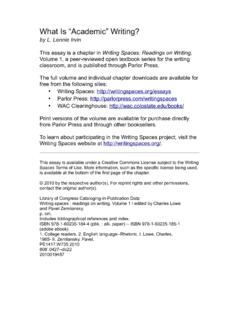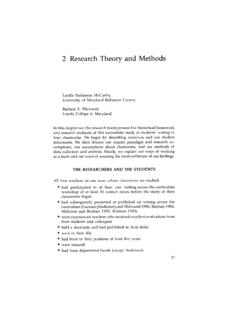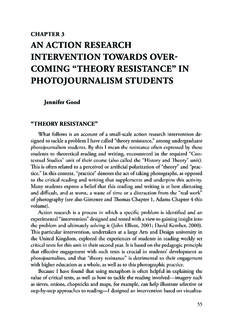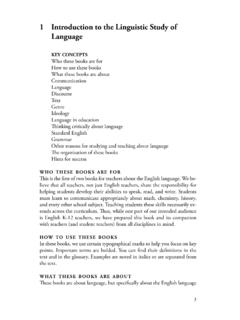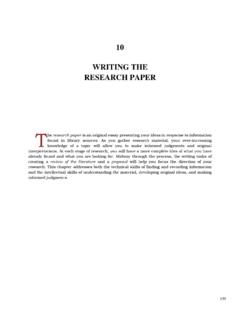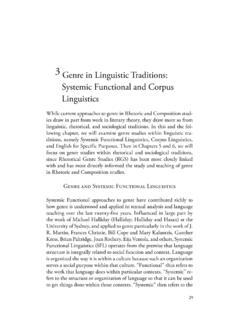Transcription of Understanding Discourse Communities - WAC Clearinghouse
1 Understanding Discourse CommunitiesDan MelzerThis essay is a chapter in Writing Spaces: Readings on Writing, Volume 3, apeer-reviewed open textbook series for the writing the full volume and individual chapters from any of these sites: Writing Spaces: Parlor Press: WAC Clearinghouse : versions of the volume are available for purchase directly from ParlorPress and through other Press LLC, Anderson, South Carolina, USA 2020 by Parlor Press. Individual essays 2020 by the respective authors. Unless otherwise stated, these works are licensed under the Creative Commons Attribu-tion-NonCommercial-NoDerivatives International License (CC BY-NC-ND ) and are subject to the Writing Spaces Terms of Use. To view a copy of this license, visit , email or send a letter to Creative Commons, PO Box 1866, Mountain View, CA 94042, USA. To view the Writing Spaces Terms of Use, visit rights reserved. For permission to reprint, please contact the author(s) of the individual articles, who are the respective copyright design by Colin of Congress Cataloging-in-Publication Data on File1007 Understanding Discourse CommunitiesDan MelzerOverviewThis chapter uses John Swales definition of Discourse community to explain to students why this concept is important for college writing and beyond.
2 The chapter explains how genres operate within Discourse Communities , why different Discourse Communities have different expectations for writ-ing, and how to understand what qualifies as a Discourse community. The article relates the concept of Discourse community to a personal example from the author (an acoustic guitar jam group) and an example of the academic discipline of history. The article takes a critical stance regard-ing the concept of Discourse community, discussing both the benefits and constraints of communicating within Discourse Communities . The article concludes with writerly questions students can ask themselves as they enter new Discourse Communities in order to be more effective communicators. Last year, I decided that if I was ever going to achieve my lifelong fantasy of being the first college writing teacher to transform into an international rock star, I should probably graduate from playing the video game Guitar Hero to actually learning to play guitar.
3 * I bought an acoustic guitar and started watching every beginning guitar instructional video on YouTube. At first, the vocabulary the online guitar teachers used was like a foreign language to me terms like major and minor chords, open G tuning, and circle of fifths. I was overwhelmed by how complicat-ed it all was, and the fingertips on my left hand felt like they were going to fall off from pressing on the steel strings on the neck of my guitar to form * This work is licensed under the Creative Commons Attribution-NonCommer-cial-NoDerivatives International License (CC BY-NC-ND ) and are subject to the Writing Spaces Terms of Use. To view a copy of this license, visit , email or send a letter to Creative Commons, PO Box 1866, Mountain View, CA 94042, USA. To view the Writing Spaces Terms of Use, visit Discourse Communities101 WRITING SPACES 3chords. I felt like I was making incredibly slow progress, and at the rate I was going, I wouldn t be a guitar god until I was 87.
4 I was also getting tired of playing alone in my living room. I wanted to find a community of people who shared my goal of learning songs and playing guitar together for needed a way to find other beginning and intermediate guitar play-ers, and I decided to try a social media website called It only took a few clicks to find the right community for me an acoustic jam group that welcomed beginners and met once a month at a music store near my city of Sacramento, California. On the site, it said that everyone who showed up for the jam should bring a few songs to share, but I wasn t sure what kind of music they played, so I just showed up at the next meet-up with my guitar and the basic look you need to become a guitar legend: two days of facial hair stubble, black t-shirt, ripped jeans, and a gravelly voice (luckily my throat was sore from shouting the lyrics to the Twenty One Pilots song Heathens while playing guitar in my living room the night before).
5 The first time I played with the group, I felt more like a junior high school band camp dropout then the next Jimi Hendrix. I had trouble keep-ing up with the chord changes, and I didn t know any scales (groups of related notes in the same key that work well together) to solo on lead guitar when it was my turn. I had trouble figuring out the patterns for my strum-ming hand since no one took the time to explain them before we started playing a new song. The group had some beginners, but I was the least experienced took a few more meet-ups, but pretty soon I figured out how to fit into the group. I learned that they played all kinds of songs, from country to blues to folk to rock music. I learned that they chose songs with simple chords so beginners like me could play along. I learned that they brought print copies of the chords and lyrics of songs to share, and if there were any difficult chords in a song, they included a visual of the chord shape in the handout of chords and lyrics .
6 I started to learn the musician s vocabulary I needed to be familiar with to function in the group, like beats per measure and octaves and the minor pentatonic scale. I learned that if I was having trouble figuring out the chord changes, I could watch the better guitarists and copy what they were doing. I also got good advice from experienced players, like soaking your fingers in rubbing alcohol every day for ninety seconds to toughen them up so the steel strings wouldn t hurt as much. I even realized that although I was an inexperienced player, I could contrib-ute to the community by bringing in new songs they hadn t played before. Dan Melzer102 WRITING SPACES 3 Okay, at this point you may be saying to yourself that all of this will make a great biographical movie someday when I become a rock icon (or maybe not), but what does it have to do with becoming a better writer? You can write in a journal alone in your room, just like you can play guitar just for yourself alone in your room.
7 But most writers, like most musicians, learn their craft from studying experts and becoming part of a community. And most writers, like most musicians, want to be a part of community and communicate with other people who share their goals and interests. Writing teachers and scholars have come up with the concept of Discourse community to describe a community of people who share the same goals, the same methods of communicating, the same genres, and the same lexis (specialized language).What Exactly Is a Discourse Community?John Swales, a scholar in linguistics, says that Discourse Communities have the following features (which I m paraphrasing):1. A broadly agreed upon set of common public goals2. Mechanisms of intercommunication among members3. Use of these communication mechanisms to provide information and feedback4. One or more genres that help further the goals of the dis-course community5. A specific lexis (specialized language) 6.
8 A threshold level of expert members (24-26)I ll use my example of the monthly guitar jam group I joined to explain these six aspects of a Discourse broadly Agreed Set of Common Public GoalsThe guitar jam group had shared goals that we all agreed on. In the description of the site, the organizer of the group emphasized that these monthly gatherings were for having fun, enjoying the music, and learning new songs. Guitar players or people who like music or even guitarists in Sacramento, California are not Discourse Communities . They don t share the same goals, and they don t all interact with each other to meet the same goals. Understanding Discourse Communities103 WRITING SPACES 3 Mechanisms of Intercommunication among MembersThe guitar jam group communicated primarily through the site. This is how we recruited new members, shared information about when and where we were playing, and communicated with each other out-side of the night of the guitar jam.
9 People who use are not a Discourse community, because even though they re using the same method of communication, they don t all share the same goals and they don t all regularly interact with each other. But a group like the Sac-ramento acoustic guitar jam focused on a specific topic with shared goals and a community of members who frequently interact can be considered a Discourse community based on Swales definition. Use of These Communication Mechanisms to Provide Information and FeedbackOnce I found the guitar jam group on , I wanted information about topics like what skill levels could participate, what kind of music they played, and where and when they met. Once I was at my first gui-tar jam, the primary information I needed was the chords and lyrics of each song, so the handouts with chords and lyrics were a key means of providing critical information to community members.
10 Communication mechanisms in Discourse Communities can be emails, text messages, social media tools, print texts, memes, oral presentations, and so on. One reason that Swales uses the term Discourse instead of writing is that the term Discourse can mean any type of communication, from talking to writing to music to images to multimedia. One or More Genres That Help Further the Goals of the Discourse CommunityOne of the most common ways Discourse Communities share information and meet their goals is through genres. To help explain the concept of genre, I ll use music since I ve been talking about playing guitar and music is probably an example you can relate to. Obviously there are many types of music, from rap to country to reggae to heavy metal. Each of these types of music is considered a genre, in part because the music has shared features, from the style of the music to the subject of the lyrics to the lexis.
